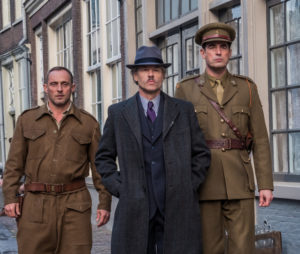STUDIO: Sony | DIRECTOR: Dan Friedkin | CAST: Guy Pearce, Claes Bang, Vicky Krieps, Roland Moller, August Diehl
RELEASE DATE: Nov. 20, 2020
DVD, DIGITAL, BLU-RAY RELEASE DATES: Feb. 23, 2021
DVD $14.99, DIGITAL: $5.99/$14.99, BLU-RAY $19.99
SPECS: R | 117 min. | Drama
Originally entitled Lyrebird when it ran in festivals last year, The Last Vermeer is a drama set in the Netherlands shortly after World War II. Based on real incidents, the film from former stuntman-turned-director Dan Friedkin tells of Joseph Piler, a Dutch Resistance worker assigned to track down paintings stolen from the Jews by the Nazis during the war. (Bang was also involved in art trickery in this year’s The Burnt Orange Heresy.)
Piler follows his leads to Han van Meegeren (Guy Pearce, Spinning Man), an eccentric art dealer with a questionable background, who’s been accused of selling a priceless Vermeer painting to Nazi official Herman Goering. How involved with the Nazis was Meegeren? And are his claims about the origins and his acquisition and sale of the painting true? These are just some of the questions that arise as the flamboyant wheeler-dealer goes to trial.
The Last Vermeer is best when it sticks to the tale of the Vermeer painting and Meegeren, thanks to Pearce’s turn as the unpredictable character who possesses some genuine mystery about him. It’s a handsome production and Bang is very watchable as the “Dutch Jew in a Canadian uniform” who has complex issues with his wife (Marie Bach Hanson), but it’s Pearce’s part that remains the fascinating, complex and, ultimately, worthy of more screen time.
The Last Vermeer is the latest entry in what has become the sub-genre of “films about stolen art by the Nazis,” which harken back to John Frankenheimer’s 1964 The Train, George Clooney’s all-star The Monuments Men (2014), the 2015 Helen Mirren starrer Woman in Gold, and the excellent 2006 documentary The Rape of Europa.
This handsome but uneven effort would make a solid double feature with any of those movies. And it likely won’t be the last project about its subject, Vermeer or otherwise.
|
Watch The Last Vermeer
|
|---|

Leave a Reply